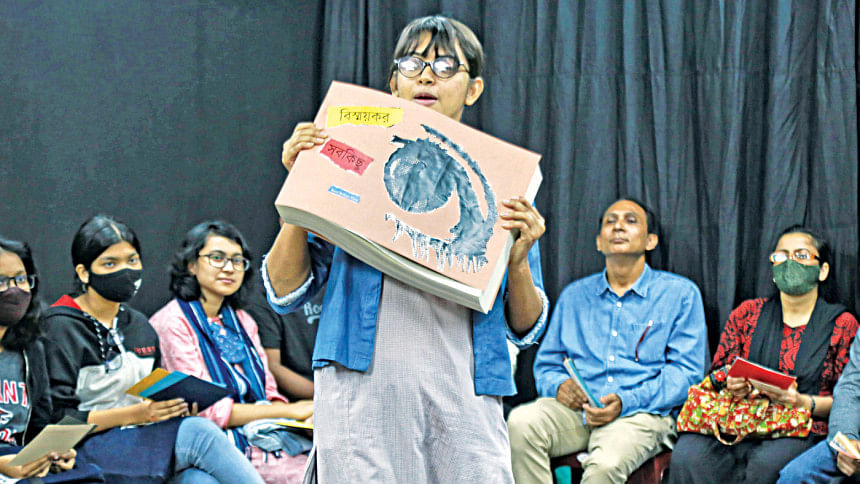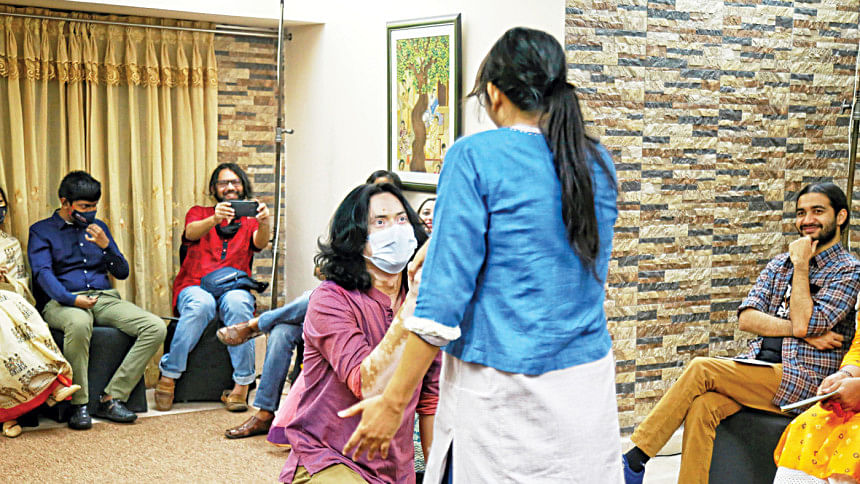Theatre from Home?

With an objective to redefine the live theatre experience, prominent troupe Spardha has been staging their third production, "Bismaykar Sabkicchu", at people's living rooms around the city. The single-act interactive play sheds light on depression for the sufferer and the ones in their ambit, while encouraging us to talk about it.
Candyfloss, rainbows, getting to watch television past your bedtime, the smell of old books, and making up after a fight — these are just a few items listed by a 10-year-old girl as she explores, "What makes life worth living?" in the play.
She compiles the list as a heartfelt response to her mother's attempt to commit suicide. As the girl ages and faces hurdles that her own life brings, the list gets longer — what started as an attempt to cure her mother's depression ends up saving the girl from her struggles later.
"Bismaykar Sabkicchu", translated and directed by Syed Jamil Ahmed and performed by Mohsina Akhter, borrows its narrative structure from celebrated British playwright Duncan Macmillan's "Every Brilliant Thing".
A prominent scholar and director, Ahmed is known for breaking barriers of convention, and has been a driving force in the growth of theatre and arts in Bangladesh for years.
He is the founder of the Department of Theatre and Music at Dhaka University, and has contributed immensely to the field through brilliant plays that provide new interpretations to theatre-based practices.
Ahmed's idea to create an alternative space together with his students led to the inception of Spardha in 2017, with an aim to produce experimental plays.
"There are personal, ideological, and organisational aspects behind the creation of Spardha. After working in the Department of Theatre and Music at Dhaka University, and freelancing in various theatre groups for a long time, I realised that ideological need alone does not drive young students to work, they also have to think about their survival," he explains. "Looking for an alternative together with some of my trusted collaborators, I decided to form an organisation where we could take risks and experiment with what we do, adhering to our ideologies."
Ahmed believes that theatre today differs heavily from what it was in the 70s and 80s. "People no longer have the luxury to spend their evenings at theatre plays. The lack of community spaces in this country and the traffic congestion restricts them from travelling to the available conventional venues that usually stage plays," he explains.
As a result, Spardha decided to take the theatre experience to people's doorsteps.
"Intimate theatre", although a popular form of entertainment in other parts of the world, is quite new to Bangladesh. "Bismaykar Sabkicchu" is intimate as the participation of audiences has a crucial role in steering the narrative. Most shows of the play have been held in people's drawing rooms till date.
However, intimate theatre plays can also be staged in conference rooms and studio offices, given that these indoor spaces are 25 feet long and 15 feet wide, and can block out noises from the outside. The minimalist productions are monologues, and require only a few props that can be carried around easily.
The lack of community spaces in this country and the traffic congestion restricts people from travelling to the available conventional venues that usually stage plays."
"Theatre is a representation of life. When a person encounters another person, there is an effort to understand one another, without that lively element, theatre is not possible," asserts Ahmed.

One of the main reasons that he chose "Every Brilliant Thing" to translate and adapt is that it addresses important issues through a simple narrative, following a child who faces mental health struggles.
"It is a subject that resonates with our lives, and needs to be addressed without any hesitation. Macmillan uses humour as a tool to alienate audiences and at the same time, brings them closer through a chronological narrative," adds Ahmed.
"Bismaykar Sabkicchu" has a Bangladeshi setting, with a carefully selected soundtrack that adds a local touch to the narrator's list of things that make life worth living, including "bakorkhani", "bela biscuit", and "Hajir biryani".Ahmed talks about the livelihoods of the middle-class and upper middle-class through the story.
Akhter exudes brilliance with her engaging performance that keeps one glued to their seat for an hour and a half. Her ability to lose herself into the character is evident in the way she makes one laugh by depicting the innocence of a 10-year-old as she responds to her mother's depression to a heart-wrenching portrayal of a mature woman on the edge of divorce, and having her own mental breakdowns. Her performance as a woman in distress evokes empathy in a manner that makes one feel as though they are conversing with a dear friend.
Audiences are seated in a circle throughout the play, often finding themselves playing minor characters like the father, teacher, vet or lover.
"Interactions are quite limited in a proscenium, where the expressions of audiences are unexposed to the performer, but in this particular play, as audiences are directly under the light and are expected to participate, I make sure that they do not feel any discomfort and participate without any hesitation," shares Akhter.
As audience participation moves the narrative along, a fair amount of improvisation on the actress's part is required, which is quite challenging.

"Each interaction varies as per the viewers and the environment and I have to improvise accordingly," she adds.
Be it audiences playing characters that have profound effects on the narrator's journey or lending their voices to "500 Miles" at the end, "Bismaykar Sabkicchu" touches one deeply.
The minimalist play shares an important perspective on parental depression and the ways of battling it. As the narrator's list reaches one million things with the audience calling out the entries in collective compassion, she gives us hope, encouraging us to share with others the burdens of our grief, and urging us to choose life.
The author is a student of Political Science, and a freelance journalist. Email: [email protected].

 For all latest news, follow The Daily Star's Google News channel.
For all latest news, follow The Daily Star's Google News channel. 



Comments